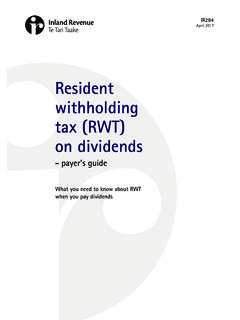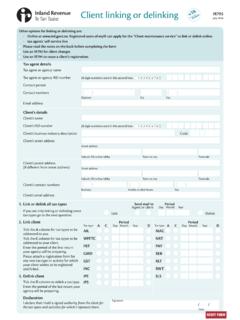Transcription of RWT on interest – payer’s guide - Stephen Larsen
1 RWT on interest payer s guide Information about RWT for people and organisations who pay interestIR 283 October guide is for people who pay interest under the RWT ( resident withholding tax) rules. It tells you when you must deduct RWT from the interest you pay, when to pay the deductions to Inland Revenue, and what information you must give to the people you pay the interest you have any questions or need more information, call us on 0800 377 774 if you re a business customer or 0800 443 773 if you re a large enterprise information in this guide is based on current tax laws at the time of ON interest payer S to our website for information, services and tools. Secure online services login to check your account information, file an employer schedule, confirm personal tax summaries and update your family details and income. Get it done online complete and send us forms and returns, make payments, make an appointment to see us and give us feedback.
2 Work it out use our calculators, worksheets and tools to help you manage your tax business like checking your tax code, or your filing and payment dates. Forms and guides download our guides, and print forms to post to can also check out our newsletters and bulletins, and have your say on items for public to get our forms and guidesYou can view copies of all our forms and guides mentioned in this guide by going to and selecting Forms and guides . You can also request copies by calling 0800 257 4 How to get our forms and guides 4 Part 1 General information 7 RWT ( resident withholding tax) what it is and why we have it 7 Income that must have RWT deducted 7 Registering as an RWT payer 9 Record keeping 10 Part 2 Paperwork and payments 11 Deducting RWT 11 RWT rates 13 When to deduct RWT 14 Certificate of exemption 14 Checking a certificate of exemption 17 Cancelling a certificate of exemption 18 Due dates for payment 19 Completing the IR 15P 21 Making the payment 23 If you make a mistake when deducting RWT 23 Penalties 26 Statement of account 28 Ceasing to be a payer 28 Part 3 Special cases 30 Joint accounts 30 Non-residents 30 Foreign currency 31 Agents or trustees 31rWT ON interest payer S GUIDE6 Part 4 At the end of the year 32 RWT withholding certificate (IR 15)
3 34 Filing certificates electronically 35 Reconciliation statement (IR 15S) 35 Disclosures in your income tax return 36 Part 5 Services you may need 37If you need more help 37 Customer service quality monitoring 37 0800 self-service numbers 37 Business tax information officers and kaitakawaenga M ori 38 Postal addresses 38 Privacy 39 If you have a complaint about our service 1 General informationRWT ( resident withholding tax) what it is and why we have itRWT is a tax deducted from some kinds of investment income before the investor receives means that people who receive investment income don t have to pay all the tax in a lump sum at the end of the year, and people who don t declare their investment income still have tax deducted from it. In these circumstances, Inland Revenue still follows up on undeclared investment income, and takes action against people who don t declare rates are shown in the table on page that must have RWT deductedResident passive income must have RWT deducted.
4 However, there are some exceptions listed on page , resident passive income is interest paid on money lent and dividends paid on company shares. interest includes any return on money lent out, except repayment of the original capital. For example, redemption payments on commercial bills (that is, the difference between the issue price and the price the purchaser receives when the bill is redeemed) are resident passive income. Commercial bills include government stock and local and public authority guide does not deal with RWT on dividends. For more information about this, read our guide resident withholding tax on dividends (IR 284).RWT must be accounted for the period 1 April to 31 March, regardless of your accounting ON interest payer S GUIDE8 Any income that fits the definition of resident passive income must have RWT deducted from it. resident passive income includes all types of interest except those listed below.
5 Exempt interest . This is: interest paid on a debt for goods or services purchased in the course of a taxable activity (trade credit) interest on hire purchases interest under a specified lease entered into before 20 May 1999 interest paid on Bonus Bonds interest paid on National Development Bonds or New Zealand Savings Certificates of less than $500 interest or a redemption payment on money lent by a non- resident to the New Zealand Government or a New Zealand public authority interest that is exempt from income tax under any Act except the Income Tax Act financial leases. Any amount expressly exempted from income tax by any other Act, to the extent of the exemption so provided. interest paid on an overpaid levy under section 173 of the Injury Prevention, Rehabilitation, and Compensation Act 2001. interest paid to someone who has been issued with a valid certificate of exemption (explained on pages 14 to 18).
6 interest paid between two companies within the same group of companies. interest paid to a non- resident (anyone who has been out of New Zealand for more than 325 days in any 12-month period and has had no enduring relationship with New Zealand in that time). interest derived from outside New Zealand by a non- resident . interest payable by a taxpayer on any unpaid you re not required to register and you pay interest , you may still have disclosure obligations in your income tax return see page as an RWT payerYou must register with us as an RWT payer if you pay out more than $5,000 a year in resident passive income, and: you pay the resident passive income as part of a taxable activity (such as a trade, profession or business, or an activity carried out by a non-profit body or local authority), or we ve issued you a certificate of exemption from RWT, or you re a non- resident but are carrying on a taxable activity in New Zealand through a fixed you re not already registered as an RWT payer , you must contact us and register as soon as your resident passive income paid out for the year exceeds $5,000.
7 You won t have to retrospectively account for RWT on the resident passive income you paid out before you reached the $5,000 , building societies and trustee companies that have a certificate of exemption must register as RWT payers, regardless of how much resident passive income they pay in a , any taxpayer who holds a certificate of exemption and whose income is (or is estimated to be) more than $2 million for any year must register as a payer if they pay out any resident passive register, fill in a resident withholding tax interest payer registration (IR 450) form and send it back to us. We will then send you the other forms you ll need as an RWT ON interest payer S GUIDE10 Record keepingWith any RWT deductions you make, you must keep records for the: total resident passive income you pay total amount of RWT and date it was deducted full name and last known address of the recipient recipient s IRD you pay interest to someone who holds a certificate of exemption (see pages 14 to 18), you must also record: the full name and address of the person or organisation you pay interest to the total interest you pay the date RWT would have been deducted the exemption or IRD number (this is shown on the certificate of exemption).
8 You must always hold enough information so we can work out the total amount of interest you ve paid. You must also keep details of all other financial arrangements on which you ve paid interest at any time during the records must be in English (unless we agree to another language being used) and you must keep them for seven years. If we are currently auditing or are considering auditing your records, we may ask you to keep them for a further three years beyond the seven-year period in which case you must do 2 Paperwork and paymentsDeducting RWTOne of the first things you must do once you have advised Inland Revenue that you need to start deducting RWT, is to ask all the people you pay interest to for their IRD numbers. You must deduct RWT from all the non-exempted interest you pay. Taxpayers who earn interest can elect their own RWT rate. If they wish to do this they can complete a resident withholding tax election (IR 456) can choose a rate of , , 30% or 33%.
9 Electing the correct rate for the total income earned for the tax year ensures that the correct amount of tax is deducted from the interest . If the rate selected is too low, the individual may have a tax bill to pay at the end of the income 1 October 2010 if an individual doesn t elect an RWT rate, but they have given you a valid IRD number, deduct RWT at for existing accounts, or 33% for new an individual hasn t provided you with their IRD number, RWT must be deducted at the no-notification rate of 33%.CompaniesCompanies must notify their interest payers that they are a 1 October 2010 to 31 March 2011 a company may elect an RWT rate of 30% or 33%. The 30% rate is only available at the interest payers 1 April 2011, a company can elect either the 28% or 33% RWT a company doesn t choose an RWT rate, but they have notified you that they are a company and have given you a valid IRD number, deduct RWT at 33% until 31 March 2011, and then at 28% from 1 April 1 October 2010, if a company has not supplied their IRD number, the RWT rate will be 33%.
10 RWT ON interest payer S GUIDE12 All othersAll other taxpayers can elect a rate of , 30% or 33%. Testamentary trusts may also elect to use If they don t make a choice, but they have given you a valid IRD number, deduct RWT at for existing accounts, or 33% for new accounts from 1 October rateYou must deduct RWT at the no-notification rate of 33% for anyone who hasn t given you a valid IRD you deduct RWT at the no-notification rate because a recipient hasn t given you an IRD number, but does so later, you can t refund the extra RWT deducted. This is because at the time you made the deduction, the no-notification rate was correct. The recipient can only recover the extra tax deducted at the end of the year either through their personal tax summary or end-of-year income tax recipients electing inconsistent RWT ratesIt s important that individuals and organisations you pay interest to, elect an RWT rate that is consistent with their taxable income.

